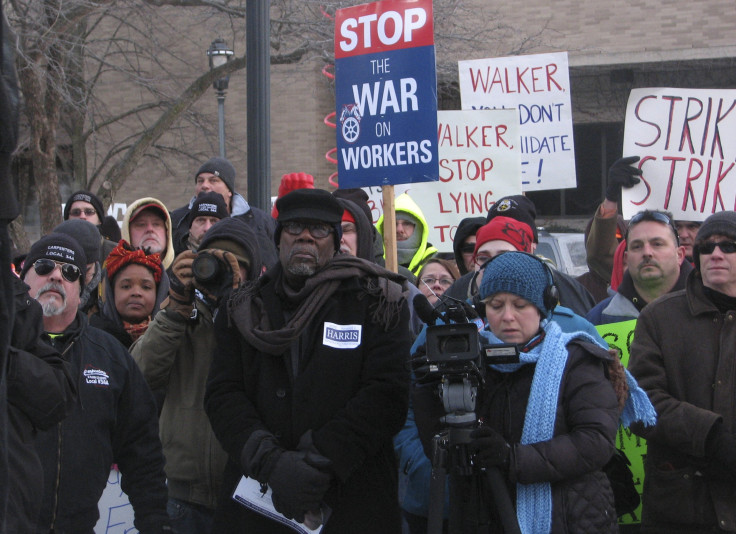What Is Right-To-Work? Wisconsin SB 44 Part Of Much Larger Battle

Wisconsin lawmakers this week are considering what’s known as a right-to-work bill. It’s a deeply divisive subject in the Badger State: Republicans love it; unions hate it. In some circles, there’s even talk of a general strike, a kind of mass walkout that the U.S. hasn’t seen in almost 70 years.
But what exactly is right-to-work and why does it matter so much?
Once a majority of employees at a workplace vote for union representation, the union is legally obligated to represent every worker in the bargaining unit, even those who voted against union representation. Not every employee has to join the union. But most states permit contracts between employers and unions that authorize the latter to collect fees from workers who decide not to join the union. The idea behind such “fair share” agreements is to prevent nonmembers from “free riding,” that is, receiving the benefits of a union contract without having to pay for the costs of negotiation and administration. Right-to-work laws, like the measure up for debate in Wisconsin, prohibit such contracts.
Unions oppose right-to-work because, for one, it makes them weaker. Right-to-work laws leave workers with little financial incentive to back unions, so membership figures tend to be much lower in states with such laws. Once a state goes right-to-work, the exodus from organized labor can be dramatic. In March 2013, right-to-work laws took effect in Michigan, a union-friendly Midwestern state not unlike Wisconsin. The following year, union membership dropped a staggering 7.6 percent. That translates into a big cut in union dues.
“There’s no doubt right-to-work is meant to have a devastating impact on private sector unions in Wisconsin,” Paul Secunda, a labor law professor at Marquette University Law School, said on Monday. “And it would be very devastating.”
It wouldn’t just hurt unions, either.
The less support organized labor has, the more leverage employers have at the bargaining table. That shift in power sends shock waves that ripple far beyond union halls. Research links the nation’s decades-long decline in union membership to trends of wage stagnation and income inequality. Workers in states with these laws make 12.9 percent less than their counterparts, when other factors are removed.
But business groups tend to back right-to-work legislation since it lowers the cost of doing business and frees up money to hire more workers. "If Wisconsin is serious about improving our business climate and growing jobs, we need to enact Right to Work," the state's top business lobby group declares on its site.
Politics factor heavily in the mix, too. If unions have less dues money coming in, they have less cash to spend on elections. Similarly, if they’re weaker overall, it’s harder for them to advocate a progressive agenda with teeth. That’s why the earliest proponents of right-to-work saw their movement as part of a bigger political battle against the left.
The first organization to push for right-to-work was the Christian American Association, a group founded in 1936 with seed money from oil companies and Northeastern industrialists. The Southern-focused operation sought to weaken unions since they posed a threat to Jim Crow and backed President Franklin Roosevelt. To this day, states that prohibit fair-share agreements are clustered disproportionately in the South.
While the cast of characters has changed, many of today’s right-to-work proponents view the cause in a similar politically charged light.
The National Right To Work Committee, which pushes its agenda through litigation and lobbying, reels in cash from top conservative donors like the Koch brothers, the Walton Family Foundation and the Coors family's Castle Rock Foundation. Meanwhile, the legislation in Wisconsin this week closely mirrors a model bill from the American Legislative Exchange Council, a conservative group focused on state legislatures.
Wisconsin Senate Majority Leader Scott Fitzgerald calls right-to-work a “game changer” for business. Maybe. But it’s clear it would change a lot more than just business.
© Copyright IBTimes 2024. All rights reserved.












